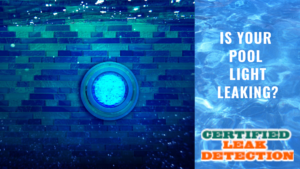
Pool lights are seldom thought about – especially during the day. At night, of course, they illuminate the pool, making it possible to enjoy an evening dip. But sometimes a pool light can do a little more, although not in a good way. It can leak.
You may be surprised to learn that pool lights are a common place for leaks to occur. According to Swimming Pool Steve, there are reasons why pool lights in particular tend to leak, and what you can do if you suspect that your pool light might be leaking.
How Can a Leak Develop in a Pool Light?
According to Rob Cox – web content developer at In The Swim – inground swimming pool lights are prone to leakage from the conduit, which is the pipe that carries the light cord from the lamp to the junction box. Pool light conduit is ¾” or 1″ gray PVC pipe running under the deck.
Regardless of the age of your pool or the type of light, all underwater lights have the same vulnerabilities.
“Because the point where the pipe connects to the light niche is not sealed, water can enter the pipe,” Cox writes. “In some cases, water in the conduit may freeze solid, cracking the conduit and start to leak out from the pool. In other cases, the conduit can be cracked during deck placement, or from shifting soils or sliding slabs.”
Obviously, freezing water isn’t a concern in Central Florida, even on our coldest days. However, the other possible causes are much more likely. Water can get into the hole that carries the conduit – which typically results in a slow leak.
Cox notes that pool light niches rarely leak. “… it’s extremely rare for a pool light to be leaking through the shell of the light niche, or around the light niche – 99% of the time a pool light is leaking, water is running out through the light conduit. Vinyl pools however, have the light niche gasket sealed to the pool wall, which has more leak potential, around the niche.”
Swimming Pool Steve elaborates on the causes of pool light leaks.
“The problems with leaking pool lights do not stop there. This is just the low hanging fruit of why your pool is losing water through the light niche or electrical conduit. Another major problem relates to changes in the composition of the electrical cord itself over time. The cord for pool lights tends to take on water and swell in size over time and this changes the way that the cord fits into the electrical conduit. If there was something temporary like silicone used to seal the wire in the conduit (don’t use silicone, definitely not the right product for this job) then changes in the light cord likely broke the weak seal that the silicone had once made and now the water readily leaks past the silicone blob in your light. Water is hard to stop. Silicone was never the right choice for this job.”
How to Locate a Pool Light Leak
If you’ve noticed the water level has dropped, you’ll start troubleshooting to determine the general location of the leak. Check to see if the pool water has dropped to the level around the top of the light. The water level may be below the skimmer bottom or the return line, but if it stopped leaking when it reached the light, then that is an indication the pool light is the cause.
To confirm the leak, Cox recommends continuing to operate the pool on main drain only (close or plug the skimmers), and allow the pool water level to drop. “If the water level seems to stabilize at the level of the light, or more precisely, just a few inches below the top of the light – you may have a conduit leak. To be certain, you can add a few inches of water and shut off the pump, plugging the skimmers, returns and the main drain pipes, and any other pool plumbing lines, with expansion plugs.
“If an inground gunite pool continues to leak with all the lines plugged tightly and the pump shut off – that means that there is a leak in the pool shell or the pool light. Vinyl liner pools have to rule out leaks in the liner, or anywhere the liner was purposely cut; such as the steps, skimmer, return, drain and pool light.”
For more advanced pool light leak detection, purchase a pool light tester, which allows you to seal up against the pool wall and add leak testing dye to see if the conduit sucks up the dye.
If the water level drops beyond the halfway mark of the light, there may be a conduit leak, but you might have another leak somewhere else in your pool. Our blog post – “How Can I Tell When My Concrete Pool Has a Leak?” – covers this issue in greater detail. When you have a pool light conduit leak, the water level stops falling beyond the port on the upper back of the light niche, the place of the conduit connection.
If you see water inside the lens of the light, it doesn’t mean the light itself is leaking. The water inside the lens means that the lamp gasket needs to be changed. When the gasket fails, water enters the fixture and surrounds the bulb. It is not the source of the leak, but needs to be replaced immediately.
Turn off the power to remove the light fitting to change the bulb or check it. If you suspect there is a leak at the fitting, tighten the screws holding the light in place. If that does not resolve the issue, call a professional leak repair service.
Can You Repair a Pool Light Leak Yourself?
Water and electricity don’t mix. While there are some jobs that you can do yourself, a few require service by a professional, and a pool light leak repair is one of them. As Swimming Pool Steve writes, “Pool safety is definitely worth the expense and a leaking pool light is not a problem you can simply ignore.”
In addition to the safety factor, many pool owners who attempt a DIY pool light repair may temporarily “fix” the problem, but set the light up for long-term problems – and a much more extensive, expensive professional repair when the fix eventually fails.
In the words of Swimming Pool Steve, “Some people use epoxy, JB Weld or some other form of permanent attempt to seal the cord. This should absolutely never be done. You must not choose a repair that prevents further service to the light being possible. That was so important I am going to say it again: You must not choose a repair that prevents further service to the light being possible.”
To accurately locate the source of any pool leak, call our experienced team at Certified Leak Detection to keep a bad situation from becoming much worse.
We use technology and techniques we have developed over 20 years in business. In addition to quick detection of pool leaks, we provide industry-leading leak detection for spas and hot tubs, as well as slabs and foundations. Serving areas throughout Central Florida – including Orlando, Longwood, Lake Mary, Sanford, Kissimmee, Clermont and Winter Springs – our team is ready to answer your call. Contact us for quick, reliable service!

